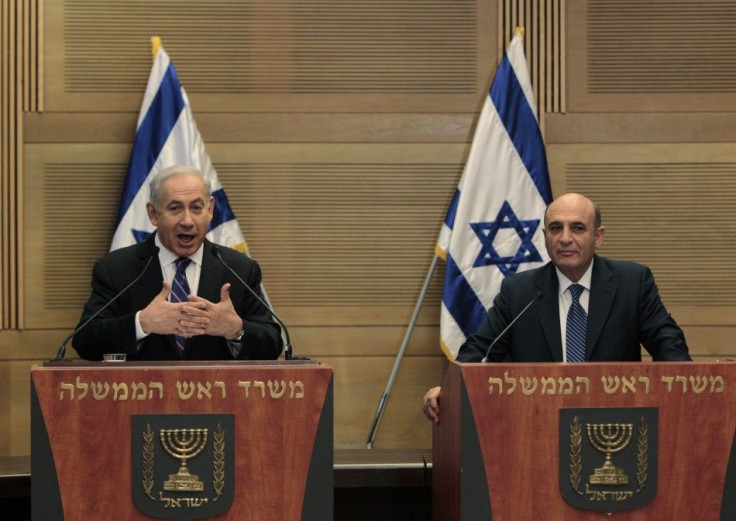Israel Returns 91 Bodies To Palestine To Ease Negotiations, But Debates Unilateral Action

On Thursday, Israel returned the bodies of 91 Palestinians to the West Bank and Gaza in hopes that the gesture would ease tensions between Israel and Palestine.
The bodies belong to Palestinian militants, some of whom died as far back as 1975. They include 20 suicide bombers who collectively killed hundreds of people in Israel.
The bodies were exhumed from an Israeli military cemetery and transferred into coffins adorned with the Palestinian flag. The BBC reports that the remains of 79 Palestinians were delivered to the city of Ramallah, where Palestinian President Mahmoud Abbas, head of the Fatah party that governs the West Bank, participated in a somber ceremony to mark the occasion.
The other 12 bodies were sent to the Gaza Strip, which is controlled by Hamas, a militant political party considered a terrorist organization by Israel.
Mark Regev, a spokesman for Israeli Prime Minister Benjamin Netanyahu, told Reuters that the bodies were delivered in an effort to build bridges.
It is our hope that this humanitarian gesture will serve both as a confidence-building measure and help get the peace process back on track, he said. Israel is ready for the immediate resumption of peace talks without any pre-conditions whatsoever.
Since 1967, when Israel occupied the West Bank and Gaza Strip following the Six-Day War, Palestine and Israel have struggled to forge a peaceful co-existence amid deep-seated mutual antagonism, stalled negotiations and violent clashes.
Today, one major issue of contention is the fact that Israeli settlements continue to permeate what Palestinians consider to be their own rightful territory in the West Bank. Palestinians have refused to negotiate for a two-state solution with Israel as long as these settlements continue.
Recently, a political realignment within Israel has generated discussion of a different alternative: unilateral withdrawal from much of the West Bank.
This month, a new coalition was formed in the Knesset -- Israel's parliament -- between Netanyahu's hawkish Likud party and the more moderate Kadima bloc. Palestinian officials hope that Netanyahu will be open to compromise now that he is no longer beholden to hardliners who embrace Israel's religious right to occupy the West Bank and maintain complete control over the city of Jerusalem.
The AP reports that in recent days, Netanyahu's Defense Minister Ehud Barak and Kadima party leader Shaul Mofaz have both suggested a unilateral move to partially remove Israeli forces from the West Bank. Netanyahu, who has so far been silent on the issue, may be amenable to the idea.
But such a move has critics on both sides. Many right-wing Israelis are loath to make any concessions to Palestinian demands. In addition, they point out, Israel's 2005 decision to pull out of Gaza resulted in major upheaval and increased militancy there, including increased rocket fire into the Israeli towns of Sderot and Ashkelon. The situation intensified after Hamas broke away from Fatah in 2007 and took control of the strip.
Many Palestinians also oppose a unilateral withdrawal. They point out that such a move would only amount to a partial measure, closing the door to further negotiations. In the Knesset, Mofaz has recommended creating a temporary Palestinian state in only 60 percent of the West Bank, which would leave many contested Israeli settlements there intact. Israel would also likely retain a strip of land along the border with Jordan, as well as the eastern side of Jerusalem. For Palestinian officials, partial control over the West Bank would fall short of their goals for territorial sovereignty.
Further complicating the issue is a separate negotiation unfolding between Hamas and Fatah. Al Arabiya reports that leaders from the two factions met in Cairo this month to agree on a plan moving forward, which they hope will lead to a functioning coalition government that unites Palestinians on both sides of the divide.
Plans to unite Gaza and the West Bank under a single government have failed several times in recent years, but a mutual desire to engage in productive talks with Israel after 45 years of conflict may yet forge a working alliance between the two Palestinian factions.
On Thursday, Fatah leader Mahmoud Abbas was focused not on Hamas but on the ceremony to mark Israel's delivery of 79 bodies to Ramallah. He stood by as a bugler played a solo rendition of Last Post, ( a famous military funeral call used by the British army) and Palestinian security forces fired guns in a military salute.
Whether Israel's delivery of the bodies will smooth the path to negotiations remains to be seen; meanwhile, Knesset politicians continue the debate on whether a unilateral, partial withdrawal from West Bank territories represents the best way forward.
If it isn't possible to reach a permanent agreement with the Palestinians, we must consider an interim arrangement or even a unilateral move, said Barak on Wednesday.
© Copyright IBTimes 2025. All rights reserved.






















